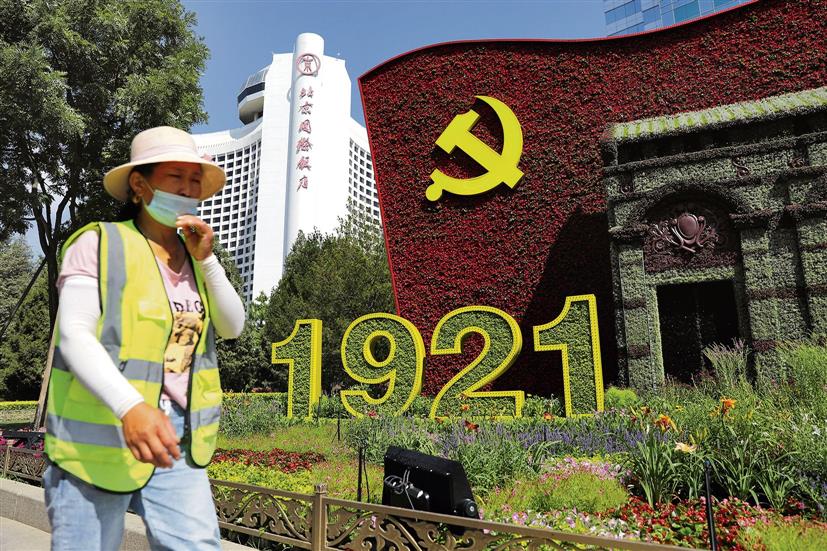
M Rajivlochan
Historian
ON July 23, 1921, the Chinese Communist Party was founded in Shanghai. Since then, the communists in China have metamorphosed many times, but always on the premise that China is destined to be a nation with a unique destiny and a unique purpose.
One of those who were present at the time when the Communist Party was born was young Mao Zedong, a librarian at Beijing University. Like most other communist leaders, he was from a prosperous peasant family, had studied well and was upset with the behaviour of the Chinese elite. The thing which perturbed the educated young ones was that the Chinese elite seemed most eager to accept the total superiority of foreigners, were willing to accept the foreigners’ judgements about all that was wrong with China and were willing to subordinate the interests of China and the Chinese people to the interests of the foreigners. In 1919, the university-educated young ones had risen in rebellion against the Chinese elite in what came to be known as the May Fourth Movement. Ironically, the Communists continued to seek detailed guidance from Stalin’s Russia. Six years later, this enabled the nationalists in China to slaughter the entire top-rung communist leadership and their seconds-in-command. The mantle of leadership of the Chinese communist movement was now picked up by Mao, as yet a relatively unknown and marginal member.
This slaughter happened because the Chinese communists followed the guidance from Stalin’s Soviet Union too literally. But this was also perhaps the last time when the communists in China took guidance from an outsider. Rather, they would set up their own systems of learning from any source which provided the best knowledge at that point of time. Few in India know that even the membership of the Communist Party in China is based on stiff competition and that every member, howsoever senior, has to undergo formal training — and refresher courses — on how to perform his task as a leader well.
Every once in a while, such a strategy of self-sufficiency has led them into blind alleys. The Great Leap Forward was one such alley, as was the Cultural Revolution. Chairman Mao’s idea that starlings and sparrows were the cause of famine in China also resulted in a dramatic destruction of Chinese agriculture. But the Chinese quickly came out of such blind alleys to chart a new path for themselves. They never lost faith in their ability to do things well. They also did not hesitate to educate themselves with the latest ideas from the western world. Thousands of students were sponsored for education to the universities of the West and then lured back to work for the nation — but on terms set by the nation, on issues of relevance to the Chinese people.
Each metamorphosis of China’s communists has been accompanied by intense internal debates, often supported by skullduggery. The winner of course takes all; the loser gets lost in the dustbin of history. Every now and then, those wanting a change have resorted to seeking allies among student rebels. Mao’s reaching out to students to execute the ill-fated Cultural Revolution ensured his control over the party, wiped out rival leaders and ensured economic stagnation. The Tiananmen Square protests of 1989 and the massacre of students that followed were another occasion when conflicts within the party leadership escalated out of control when one set of contenders sought to leverage support from students to win ideological battles within the party. These students, among the most elite within China, occasioned neither sympathy nor support from the people at large.
Subsequently, the Chinese abandoned the path of communism and took to capitalism. Capitalism with a Chinese twist was, it is popularly believed, characterised by the State allowing private entrepreneurship. But more important than that was the synergies which the State created for private entrepreneurship, the enabling environment that was created by the State. Chinese entrepreneurs — as also entrepreneurs from countries like India — soon discovered that the government had set up a significant number of self-governing townships which, for want of a better phrase, allowed for plug-and-play entrepreneurship. Here, various civic and tax permissions were facilitated by the government. Labour trouble was pre-empted by simply providing workers with adequate housing, insurance, healthcare facilities and affordable food. All at the initiative of the government.
Moreover, the Chinese authorities took the initiative to ensure many small, piecemeal, non-tax benefits to businesses. One of the most interesting episodes in this regard was the treaty that China Post negotiated with the US Postal Service under UPU rules in 2010-11. This enabled the Chinese to send to America parcels below 1.5 pounds at competitive rates. Shipping a similar parcel from California to New York was costlier. The ever-hungry retail consumer markets of America were soon flooded with cheaper Chinese products. It was only in 2019 that the Americans wised up to the advantage that they had provided the Chinese over US businesses. The Indian Postal Service, the superior managers of India Post, struggling to keep the postal system relevant, did not even seem to be aware of the loopholes in the UPU rules that allowed such an advantage to the Chinese.
The Chinese government did take care to ensure that deleterious ideas from outside were nipped in the bud. One such idea was a founding idea from the earliest days of the Soviet Union, the idea of nationalities and self-determination. This idea, of presuming that the world was made up of distinct natural nationalities and that each nationality had the right to remain self-governing, was as incorrect as it was simplistic. It had no historical basis, no moral superiority, and yet had become a key idea of governance models approved of by the West. Not only did the Chinese abandon this idea, they also ensured that as the social media revolution was unleashed on the world in the first decade of the 21st century, it would not become the facilitator of ideas which were likely to break up China.
In this regard, their strong belief in the greatness of their culture helped. The Communist Party was never in doubt that there was a single Chinese nation whose territories existed bounded on one side by the sea, on another side the deserts and on the third side the Himalayas. There was no ideological doubt over this unity.
In the spring of 1947, when India’s nationalist leadership was still debating whether India was a geographical entity or a nation made up of religions masquerading as nationalities, the Chinese delegation to the Asian Relations Conference emphatically informed their Indian hosts of Tibet being but an outpost of China. Irrespective of whether there was any geographical or historical basis for these claims, the mere fact of constant assertion, backed up by a belief in the uniqueness of the Chinese people, has meant that the Chinese willed a nation into being and today the world is left with little option but to accept their contention.
Join Whatsapp Channel of The Tribune for latest updates.




























